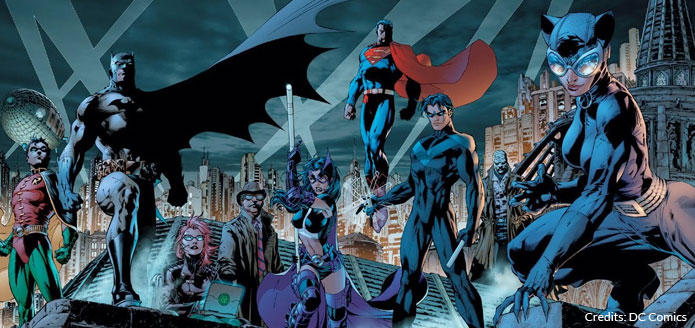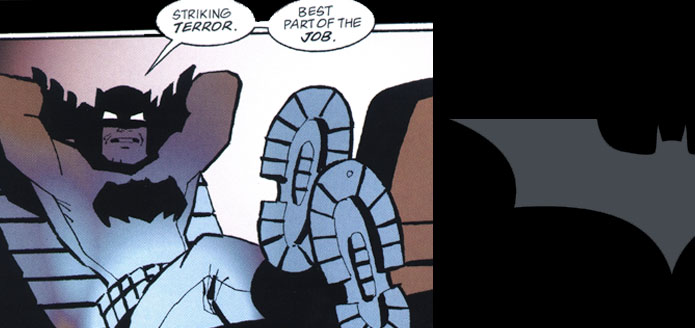You have not become Batman yet? This is proof that you did not understand the character. But rest assured, everyone can make mistakes, and I’d be happy to explain all the reasons why it is imperative that we all become Batman.
However, before getting into the thick of it, a small historical detour is needed to understand the genesis of the most famous of superheroes.
The birth of a myth
“It took them a while to catch on that Batman would be the greatest.”
Bob Kane
The character made his first appearance in the title Detective Comics in 1939. Although it has evolved thereafter, Batman has already all his key features: it is a human vigilante who fights crime in a bat costume. His success was immediate, and in 1940, he is given his own title.
75 years later, he became the most popular superhero of humanity, and the shadow of his cape covers 7 film adaptations and nearly thirty comics titles, not to mention series or video games.
Yet the world has changed dramatically since its inception, and this raises the question of how, despite the generational and cultural differences, Batman continues to exert such a deep fascination on the collective psyche.
It seems impossible to answer this question without considering the mythological dimension of the character.
The myth plays a fundamental role in the interpretation a civilization makes of reality. Its main role is to answer questions that rationality cannot answer alone, such as: what is the meaning of existence? What is freedom? What is the origin of evil? By staging the gods, demons and heroes in intrigues of cosmic scale, the myth does not explain logically the nature of the world, but rather makes us feel the forces that underlie it through an initiatory story.
But above all, the role of myth is to turn the broken puzzle of reality into a coherent figure: it is a global representation that shows the essence of a time. This is why Pop culture is such a great indicator of the inner workings of our unconscious, and heroes to whom we choose to identify a prism through which our dreams, our fears and our potential reveal themselves to us.
The twentieth century has led to the destruction of the extended family and its reduction to a single cell. It has created generations of emotionally disabled children. Consumerism has locked humans in a prison in artificial needs and keeps them in a constant state of contradiction. Economic and social inequalities dive millions of people in despair every day. Science has stripped the man of his connection to the spiritual. The city has become a hostile prison of concrete that has obstructed the whole horizon.
The character of Batman naturally emerges from the hollow formed by all these social rips. He is an orphan, but has overcome her trauma by a constant effort of will. He is a billionaire, but his unwavering discipline allows him to overcome the temptation to misuse his money. He tirelessly fights crime and injustice, but with human means. Finally, he became the master of the urban jungle. He is also the synthesis of a number of archetypes of heroes such as Zorro[1], Sherlock Holmes [2]or James Bond (that he prefigures with more than ten years).
Initiation to light and darkness
“But a criminal is not complicated. What you really fear is inside yourself. You fear your own power. You fear your anger, the drive to do great or terrible things.”
Henri Ducard to Bruce Wayne, Batman Begins
Batman thus functions as a myth that meets the codes of the modern era. It is a human being to which anyone can relate to, and he defends the values of justice that resonate with our collective aspirations.
Some critics have analyzed his character as a sociological apologia of capitalism. After all, Bruce Wayne is a rich heir, and the fact that it is presented as a positive role model can be seen as disguised promotion of a liberal ideal.
To my opinion, it is a deep misunderstanding of the depth of the character. To become the Batman, Bruce Wayne has to go through a series of initiations in order to confront his inner shadows. To do so, he must renounce to all worldly attachments. This is very well developed in Batman Begins movie when Bruce Wayne is confronted with a local mob boss. The latter replied that he is not afraid of him because he is just a rich traumatized kid. This discussion triggers a sudden awareness in Bruce Wayne. Realizing for the first time that his wealth is not an help, but a false security that encloses him in a fake existence, he goes out in the street, gets rid of his papers and exchange his luxurious coat for the anonymous mantle of a beggar before disappearing into the night, beginning a long quest for seven years to get to know himself.
This initiation will, ultimately, bring on a single theme: fear. How can one overcome his fear? How to make it an ally to serve justice?
This is, in my opinion, the real thread that connects the myth of Batman and that we live in our daily existence. The consumer society constantly feeds us with derivatives that prevents us from turning our attention to ourselves in order to face our fears. Fear of suffering. Fear of old age. Fear of loss. Fear of death. Fear to express who we are and what we really desire.
This is this refusal to confront our fears that prevents us to accomplish ourselves.
Yet, we feel that each additional security which we surround ourselves in our existence diminishes us. As we feel that if we found in ourselves the strength to overcome our fears to stand up against injustice, something extraordinary would happen.
From this point of view, what the saga of Batman really illustrates is that we are not determined by our social origin, but by our decisions.
The truth is like the Holy Grail: to be obtained, we must face despair and doubt. We must give up all our attachments to focus solely on accomplishing an ideal that is greater than ourselves.
Humanity has never been confronted to so much fears as today. The real lesson given by Batman is that the only answer to fear is to confront it tirelessly with our heart and will until we have conquered every of our shadows. This is the only way to turn it into a positive force.
[i] The first episode of Batman features the murder of the parents of Bruce Wayne as they exit a movie theater playing the Revenge of Zorro. Batman creators Bob Kane and Bill Finger used Zorro as an explicit source of inspiration, and the character of Batman takes over the main features of the Spanish vigilante: a black mask suit and vehicule, the fight for an ideal of justice, exclusive use of bladed weapons fight crime, etc.
[ii] Batman is primarily a detective that analyzes minutely every detail to get to the truth. He also shares with the famous British investigator an analytical, introverted and solitary nature.


